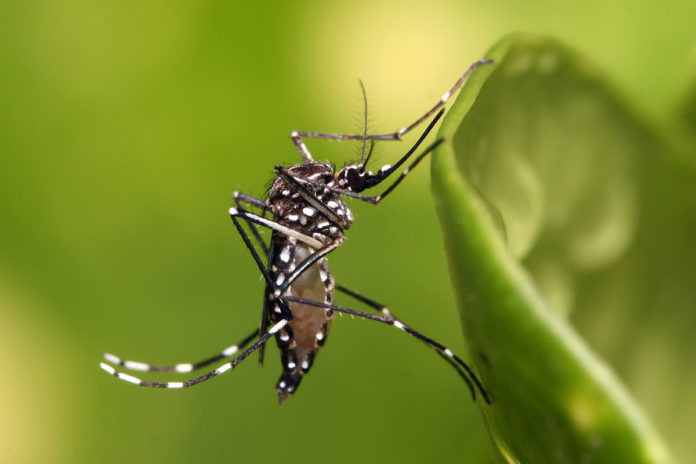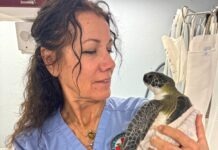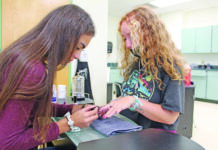
Conversations continue over Oxitec’s genetically modified mosquitoes amid the upcoming deployment of 130 boxes containing eggs in 15 areas in the Keys.
Exact locations weren’t made public, but the Florida Keys Mosquito Control District in February confirmed that it would be initiating trials in April with projects focused in a select number of neighborhoods between MM 10 and 93. Last May, the technology was approved by the U.S. Environmental Protection Agency for an experimental use permit in Monroe County.
On March 18, Islamorada Village Council heard from several independent scientists who discussed information and issues behind the genetically modified mosquitoes for population and disease suppression. The scientists collectively said they’re neither for nor against the release. A representative from the Florida Keys Mosquito Control District and one from Oxitec responded following the presentation.
Fred Gould, professor of North Carolina State’s Department of Entomology and Plant Pathology, briefly explained the strain of mosquitoes (OX5034) set for release. He said he was involved with another strain of genetically modified mosquitoes in development in 2010 when a field case study was conducted in Mexico.
“In the laboratory, it turned out the male mosquitoes flew fine and mated well. But in the real environment, they weren’t as strong as the wild type mosquitoes and they basically had 3% of the matings. Instead of having half the matings, they had very few,” he said.
Gould went on to say that this is also shown in work by Oxitec in Brazil, where it turns out that the genetic mosquitoes “are not very fit.”
“It would take 30 of them, at least, to be equal to an individual wild type in terms of how many matings you have,” he said. “When you’re thinking about that, you have to recognize you have to release a lot of mosquitoes in order to have any activity. I just want to bring that home to you that it goes up and down as to what that percent fitness is, and we don’t know what that’ll look like in Florida.
“Will it work? I want to say it might work just fine,” he continued. “There’s a chance that they’ll be doing these releases and it won’t be a simple thing.”
Jennifer Kuzma, professor of public and international affairs at NC State, outlined a lack of higher level oversight involving not only federal agencies, but also interested parties and external expert advisory panels. Specifically, Kuzma said the Environmental Protection Agency experimental use permit was closed for external input and public review. She also said there weren’t any published peer review studies prior to the decision, and no external, independent scientific panel was convened.
“Will it work? I want to say it might work just fine,” he continued. “There’s a chance that they’ll be doing these releases and it won’t be a simple thing.”
— Fred Gould, professor of North Carolina State’s Department of Entomology and Plant Pathology
“EPA also published the risk assessment document only after the public comment period was over and after the permit was granted,” she said. “It’s quite unusual for a risk assessment on this biotechnology product not to be available prior to the public comment period. For example, when the FDA reviewed the prior Oxitec technology, the assessment was available prior to a public comment period and publication in the Federal Register.”
Natalie Kofler, molecular biologist at Harvard University and founder of Editing Nature, said she can see the technology’s public health benefit and reducing use of pesticides. However, she said there’s a big risk involved, and there’s a “real onus on all of us to try and make sure these decisions are made as responsively as possible.”
Koefler stressed the need for data transparency through establishment of a dashboard for public access, assessment by independent experts and citizen-science.
“It means community-based participation in scientific projects,” she said. “There’s a potential to be able, for community members, to help collect mosquitoes and help submit those mosquitoes to those who are doing the monitoring. There’s also the possibility for citizens themselves to differentiate from male and female mosquitoes.”
Dr. Stan Zuba, a member of the Florida Keys Mosquito Control District board since 2016 and a local pediatrician, said the presentations were very thorough, but have been done over and over again. Zuba said the information presented has been answered, and the best comment that came out of it was from Kuzma, who said “even scientists have their own biases.”
“If there were any scientists who had biases, it was the scientists who spoke tonight,” he said. “They have clearly shown their biases throughout the years against Oxitec and against this experiment.”
During remarks, Zuba said the aedes aegypti has no business in the Keys, and it’s the carrier for dengue and zika, as well as dog and cat heartworm disease. The aedes aegypti was responsible for last year’s dengue outbreak that saw more than 50 cases in the Upper Keys and a 2010 outbreak in Key West.
In addition, Zuba said, the aedes aegypti is 100% resistant to the common pesticide permethrin, and up to 50% resistant to naled, which FKMCD use as an adulticide when mosquito numbers rise.
“This trial we are pursuing jointly with Oxitec is so important to residents of Monroe County. If proven successful in suppression, we will have another weapon to rid us of this horrific, invasive insect that shouldn’t be here in the first place,” he said. “This technology, which is already being studied in other countries and around the world, and despite what you heard, is being found to be very successful with no unintended consequences to public health or environmental issues.”
Responding to the independent scientists’ presentation, Zuba said Islamorada approved the mosquito release “overwhelmingly” in a 2016 referendum. He said Oxitec’s technology was independently tested and evaluated by the U.S. Environmental Protection Agency, U.S. Centers for Disease Control and eight Florida departments, including the departments of health, fish and wildlife and agriculture and consumer services.
Concerning oversight, Zuba said the project is closely watched by the local mosquito control board, U.S. EPA and Florida regulatory agencies. Results of the release will be evaluated by the CDC, he said.
“I don’t know how much more oversight you can use, unless somebody is standing by each box with a flashlight overnight, which we might have to do to protect them from vandals,” he said.
As for no peer review, Zuba said more than 100 scientific studies have been published relating to Oxitec’s technology, all of which went through an exhaustive review process.
“I don’t know how much more oversight you can use, unless somebody is standing by each box with a flashlight overnight, which we might have to do to protect them from vandals.”
— Dr. Stan Zuba, member of the Florida Keys Mosquito Control District board since 2016
And as for the public being told “nothing,” Zuba said the mosquito control has carried out extensive public engagement. He also said requests for trial boxes with Oxitec mosquito eggs are “going through the roof.”
“In fact, we’ve had 11 public educational webinars over the last six months or so, which have featured presentations by representatives explaining everything the presenters had concerns about,” he said. “When people say the public is uninformed, that’s an untruth.”
Nathan Rose, Oxitec’s head of scientific and regulatory affairs, said the EPA was thorough in assessing safety to humans and animals in the Keys. Rose also said Oxitec addressed a letter U.S. Rep. Carlos Gimenez recently sent to the EPA containing questions regarding genetically modified mosquitoes released under the experimental use permit; adverse effects on the Keys ecosystem and specifically to threatened or endangered species; and the effect on the local food chain.
Rose concluded by stating that Oxitec has released over a billion mosquitoes worldwide with no adverse effects and effective control of the aedes aegypti. The EPA has put restrictions on where GMOs can be released within the vicinity of tetracycline, which can be found at citrus orchards or sewage treatment plants.
“This is not premature science that is either unknown or controversial. Its success has been demonstrated in Brazil, particularly, with this new strain that will be used in Florida. All that’s planned in the Florida Keys is really just a demonstration in the U.S. of technology that has been demonstrated to work elsewhere.”
Councilman David Webb said all technologies need to be driven toward multispecies control. Even if Oxitec proves to be incredibly successful in removing aedes aegypti, it still leaves unknowns as to what happens next.
“Everything is in balance out there, and if you eliminate one, then somebody else might come in. It might be better. It might be worse,” he said. “One of the criticisms in this particular experimental use permit it, they don’t have any way to measure that and they don’t have any idea what would happen if that happened.”
Webb said most concerns from citizens he’s heard from surround the lack of independent oversight over things Oxitec has done.
“They are very protective of their proprietary information, which is understandable,” he said. “But they’re not very open about changing any of that. From my standpoint, Oxitec’s approach is making it extra difficult for me to support, even though I know we need different technologies to control mosquitoes.
“I see our role though as you still follow up because there are still lingering questions,” he continued. “I think there’s additional levels of safety that can be added to this to make it even more reliable and credible as we go forward.”





















